150 Best Famous Novels Jokes and Puns: Literary Laughs You Cant Resist
Ever wondered what Hamlet would say after a bad pun? Probably something darkly witty! Get ready to unleash your inner bookworm with our collection of famous novels jokes and puns. We’ve scoured the literary world to bring you the most hilarious wordplay inspired by your favorite stories.

From the depths of Moby Dick to the heights of Pride and Prejudice, no classic is safe from our pun-tastic treatment. Prepare for some side-splitting humor that will have you quoting your favorite books in a whole new light.
So, if you’re a literature lover who appreciates a good laugh, you’ve come to the right place. Let’s dive into the world of funny famous novel jokes!
Best Famous Novels Jokes and Puns: Literary Laughs You Cant Resist
- Why was *Moby Dick* such a bad roommate? He was always harpooning the remote.
- I tried to write a novel like *Pride and Prejudice*, but it was just a bunch of first impressions.
- *The Catcher in the Rye* is a real page-turner, but I’m afraid of getting phony with it.
- What did the librarian say after reading *1984*? “Big Brother is watching…my overdue fees!”
- A book about a man who can only read backwards? It’s *A Clockwork Orange* in reverse.
- I asked my friend if he’d read *War and Peace*. He said, “Yeah, I skimmed through it during a really long, boring peace treaty negotiation.”
- I wanted to write a gothic novel like *Frankenstein*, but my monster ideas just weren’t coming to life.
- Why did *The Great Gatsby* get a bad review? Because it was all flash and no substance, old sport.
- Did you hear about the chef who wrote a novel about soup? It was a consommé of literary genius!
- I tried to write a mystery novel like Agatha Christie, but I kept getting all the characters mixed up—it was a real *And Then There Were None* situation.
- My friend’s thriller novel kept me on the edge of my seat, it was a real *Gone Girl* of a read.
- A book about a baker who gets lost in his own kitchen? A real *Breadcrumbs* adventure.
- What’s a pirate’s favorite novel? *Treasure Island*, matey! He loves the buried plot.
- My novel about a talking dog didn’t sell well, I guess the readers thought it was a bit ruff.
- I tried to write a romance novel, but all my drafts ended up as *Love in the Time of Cholera* – incredibly awkward and infectious.
Classic Novels: Pun-tastic Reads
Looking for a laugh with your literature? Dive into “Classic Novels: Pun-tastic Reads,” a collection celebrating the lighter side of literary giants! From Austen-tatious wordplay to Dickensian double entendres, we’ve mined the humor hidden within beloved stories. Prepare for witty takes on familiar characters and plots – it’s a reading…
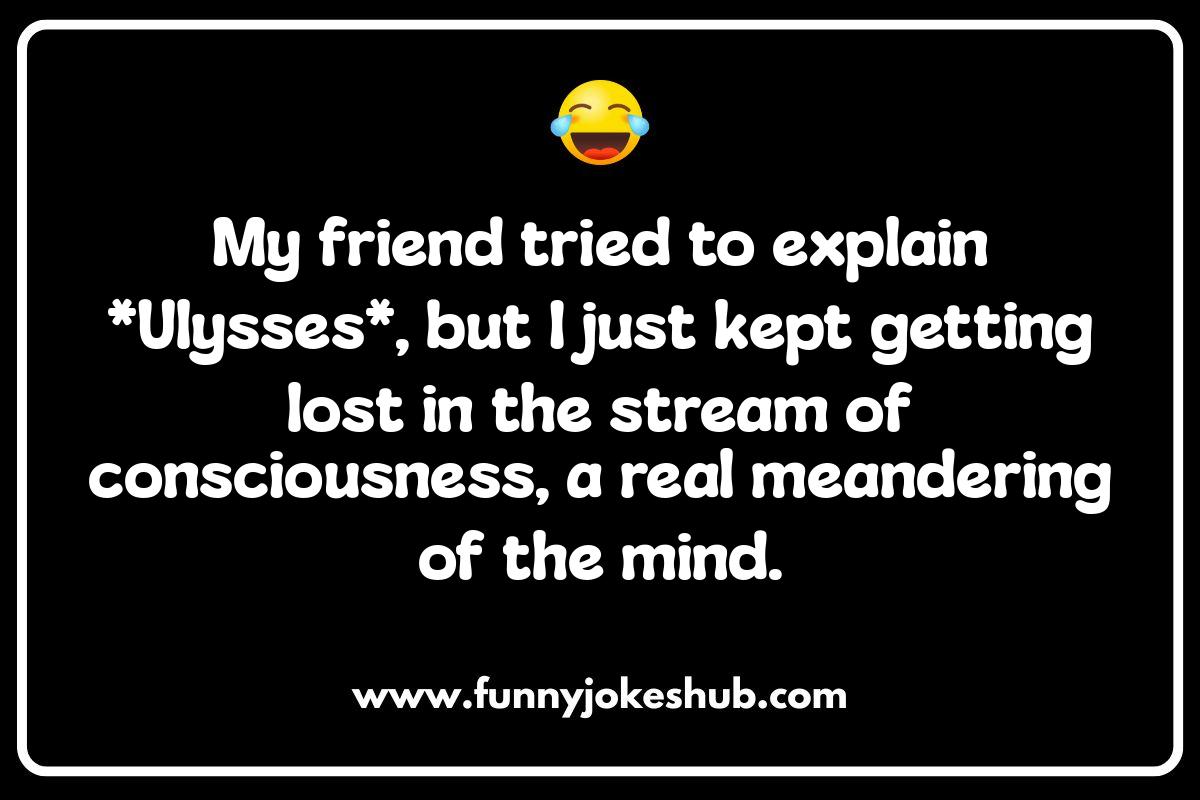
- My friend tried to explain *Ulysses*, but I just kept getting lost in the stream of consciousness, a real meandering of the mind.
- I asked a character from *Frankenstein* for dating advice, but they said it was all about re-animating old flames, a real monster of a problem.
- What do you call a group of mystery novels that are always arguing? A real plot twist of disagreements.
- I tried to get a serious conversation going with a character from *The Picture of Dorian Gray*, but they were always so Wilde-ly obsessed with their own appearance.
- Why did the *Moby Dick* get a bad review? It was a whale of a tale but a bit too long and drawn out.
- My attempt to write a novel like *Wuthering Heights* ended up being a real stormy mess, a real heart-break of a story.
- I tried to get a serious conversation going with a character from *Anna Karenina*, but it was always a train wreck of emotions.
- What did *The Great Gatsby* say when he got a new suit? “It’s a real old sport, a perfect fit for my lavish lifestyle!”
- I tried to get some financial advice from a character in *A Christmas Carol*, but he just kept talking about the importance of giving back, a real Scrooge-y mindset.
- I asked a character from *Don Quixote* for directions, but they just kept tilting at windmills, a real lost cause of a journey.
- Why was *Jane Eyre* so good at keeping secrets? She was always so Byronic and mysterious, a real gothic heroine of silence.
- I tried to get a serious conversation going with a character from *Les Misérables*, but it was always a barricade of despair.
- What did *Pride and Prejudice* say when it went to a party? “I hope this isn’t a social faux pas, a real dance of manners and expectations.”
- My attempt to write a novel like *One Hundred Years of Solitude* ended up being a real family saga, a real cycle of generations and stories.
- I tried to get a serious conversation going with a character from *The Count of Monte Cristo*, but it was always a long game of revenge, a real tale of betrayal and redemption.
Literary Characters: Jokes That Jump Off the Page
Ever wondered if Hamlet had a punny side? Or if Elizabeth Bennet could deliver a witty comeback sharper than her gaze? “Literary Characters: Jokes That Jump Off the Page” explores the hidden humor within our favorite novels, revealing how authors subtly weave jokes and puns into character interactions. It’s a…
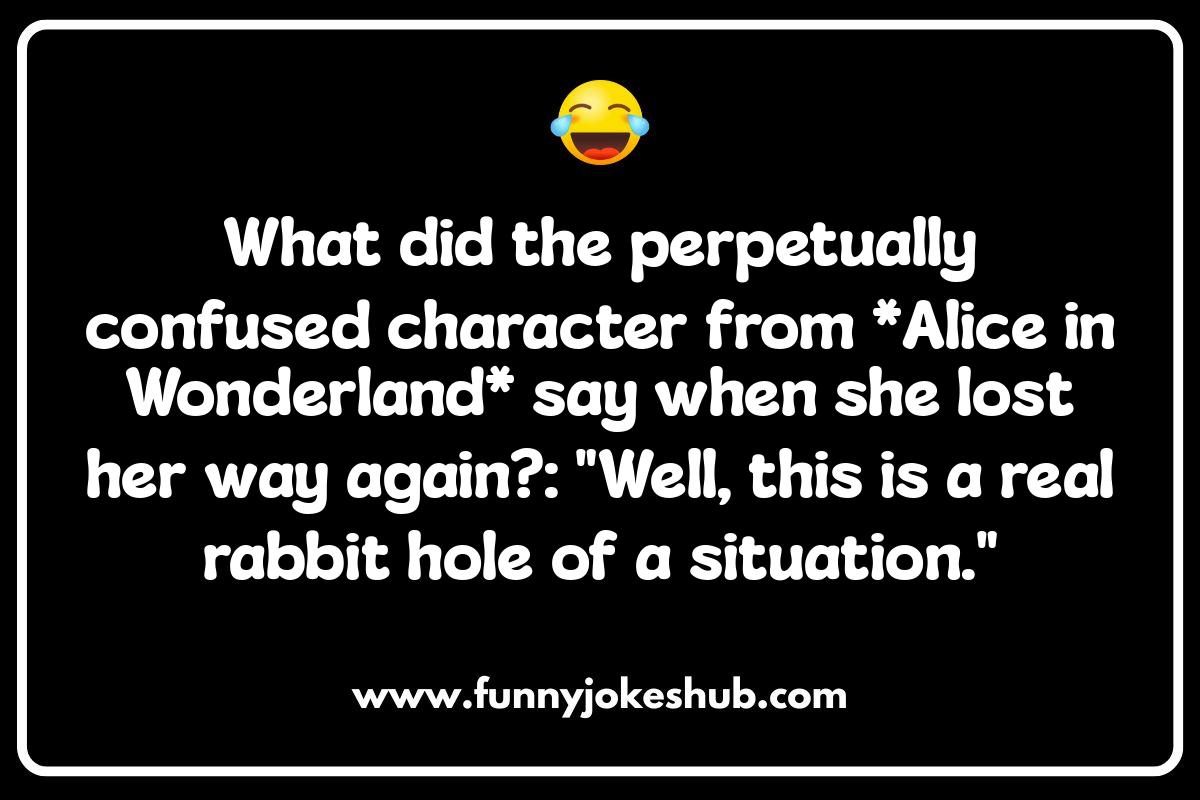
- What did the perpetually confused character from *Alice in Wonderland* say when she lost her way again?: “Well, this is a real rabbit hole of a situation.”
- Why was the character from *The Old Man and the Sea* such a bad fisherman?: He was always getting lost in his Hemingway-esque internal monologues.
- I tried to have a serious conversation with a character from *The Lord of the Rings*, but they were always so preoccupied with the ring: a real precious problem.
- What did the character from *A Tale of Two Cities* say after a particularly difficult day?: “It was the best of times, it was the worst of times…and I need a drink.”
- Why was the character from *Frankenstein* such a bad comedian? He kept re-animating old jokes, and they never quite landed.
- I asked a character from *Wuthering Heights* for relationship advice, but they just said it’s all a storm of passionate pain: a real heart-breaking experience.
- What did the character from *The Picture of Dorian Gray* say when he saw his portrait? “This is a Wilde-ly unflattering reflection.”
- Why did the character from *To Kill a Mockingbird* get such bad reviews as a lawyer?: He kept getting lost in his Atticus-like moralizing, a very justice-driven dilemma.
- I tried to get a serious conversation out of a character from *One Hundred Years of Solitude*, but they kept going off on tangents about family history: a real cycle of stories.
- What did the character from *The Invisible Man* say when he couldn’t find his keys?: “Well, this is a rather transparent problem.”
- Why did the character from *The Great Gatsby* refuse to use a map?: He preferred to follow the green light, a real beacon of hope, or was it?
- I tried to get a serious conversation going with a character from *Beloved*, but it was always a haunting memory of the past, a real spirit-filled experience.
- What did the character from *Catch-22* say when he was asked to explain his logic?: “It’s a paradoxical situation, a real catch of confusion.”
- Why was the character from *Les Misérables* such a bad baker?: He kept getting lost in his Jean Valjean-esque tales of woe, a real bread-and-butter problem.
- I tried to have a serious conversation with a character from *The Odyssey*, but he just kept going on and on about his long journey, a real winding road of stories.
Novel Plots: Witty Twists and Turns
Dive into the delightful chaos of famous novels where plot twists aren’t just shocking, they’re hilariously clever! Imagine Darcy proposing… with a pun! Or Hamlet’s soliloquies becoming stand-up routines. These witty turns on classic narratives make us laugh while appreciating the genius of the original plots, proving great stories can…

- My friend tried to write a novel about a sentient garden gnome, but it was a real plot-ter of confusion.
- I wanted to write a thriller about a librarian, but it was always a bit too shelved for my liking, a real page-turner with a lot of Dewey-decimal suspense.
- A book about a detective who only solves literary crimes? A real novel approach to investigation.
- I tried to write a romance novel about a time-traveling historian, but it kept getting lost in the period details.
- A satire about a group of overly dramatic poets? It was a real verse-atile twist of ironic events.
- I tried to write a fantasy novel about a talking cat, but it was a real *cat*-tastrophe of a story.
- My attempt to write a mystery novel ended with a character saying, “It was me all along, and also, I had a motive…but it’s not very interesting.”
- A novel where all the characters are metaphors? It was a real symbol of confusion.
- My friend’s sci-fi novel about a sentient toaster was surprisingly moving; it really had a warm heart.
- A book about a group of philosophers on a road trip? A real journey of thought.
- I tried writing a novel about a sentient map, but it always led to dead ends.
- The experimental novel was a mess, it kept breaking the fourth wall and talking about itself, a real meta-narrative problem.
- My friend tried to write a romance novel about a librarian and a chef, but it was too many *cooks* in the library.
- A novel where all the characters speak in puns? It was a real pun-derful experience, a true wordplay of events.
- I tried to write a historical fiction novel about a medieval jester, but it was a real farce of errors, a real jester-piece of mistakes.
Famous Authors: Their Humorous Side
Ever wondered if your favorite serious authors had a funny bone? They did! Delve into ‘Famous Novels Jokes and Puns’ and discover the surprising wit of literary giants. From subtle sarcasm to outright absurdity, these authors, often known for their profound works, also crafted brilliant, humorous moments. Prepare to chuckle…
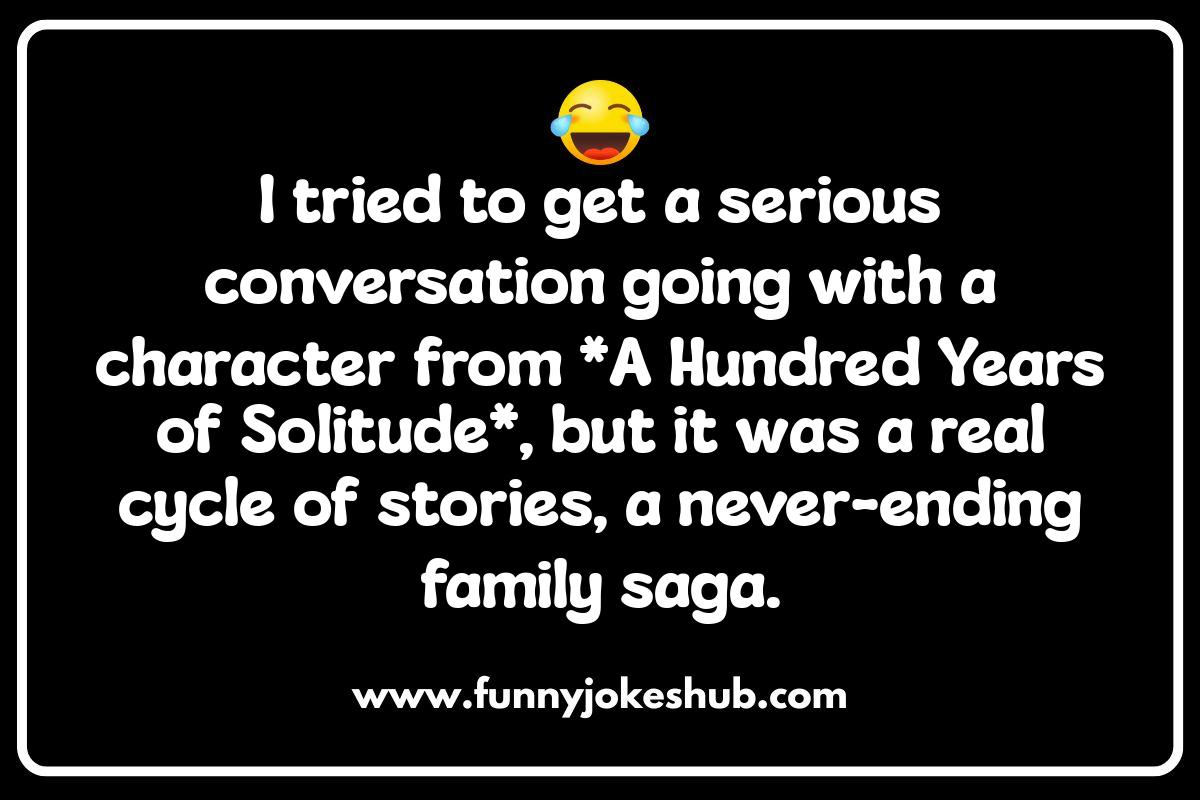
- I tried to get a serious conversation going with a character from *A Hundred Years of Solitude*, but it was a real cycle of stories, a never-ending family saga.
- What did the character from *The Scarlet Letter* say when she got a bad grade?: “This is a real A-shame!”
- Why was the character from *The Metamorphosis* so bad at parties?: He always brought a real bug-tastic energy.
- I tried to discuss my novel with a character from *The Sound and the Fury*, but it was a real stream-of-consciousness experience, a Faulkner-ing of my patience.
- What did the character from *Heart of Darkness* say when he got lost?: “This is a real journey into the interior of confusion.”
- My friend tried to explain *Infinite Jest*, but it was all a bit too footnoted and convoluted, a real Wallace of a challenge.
- Why did the character from *The Stranger* get a bad review?: He was always so aloof, a real Camus of disinterest.
- What did the character from *One Flew Over the Cuckoo’s Nest* say when they finally escaped?: “This is a real flying-high moment of freedom.”
- I tried to get a serious conversation going with a character from *The Trial*, but it was a real Kafka-esque experience of confusion and absurdity.
- Why was the character from *Beloved* such a bad comedian?: Her jokes were always a haunting memory of the past.
- What did the character from *Invisible Man* say when he couldn’t find his keys?: “This is a real transparent problem.”
- My friend tried to explain *Gravity’s Rainbow*, but I got lost in the parabolic plot, a real Pynchon of confusion.
- Why did the character from *A Clockwork Orange* refuse to go to the library?: He preferred a more ultra-violent scene, a real droog experience of anarchy.
- I tried to get a serious conversation going with a character from *Mrs. Dalloway*, but it was a real stream of consciousness, a meandering of thoughts.
- What did the character from *The Sun Also Rises* say when they ran out of wine?: “This is a real Hemingway of a problem.”
Book Titles: Wordplay and Puns
Ever chuckled at a book title that’s a clever pun? Think of “Pride and Prejudice” – could it be about a peacock fashion show? Famous novels often inspire wordplay. These literary jokes aren’t just for laughs; they highlight the power of language and how a well-chosen title can be both…
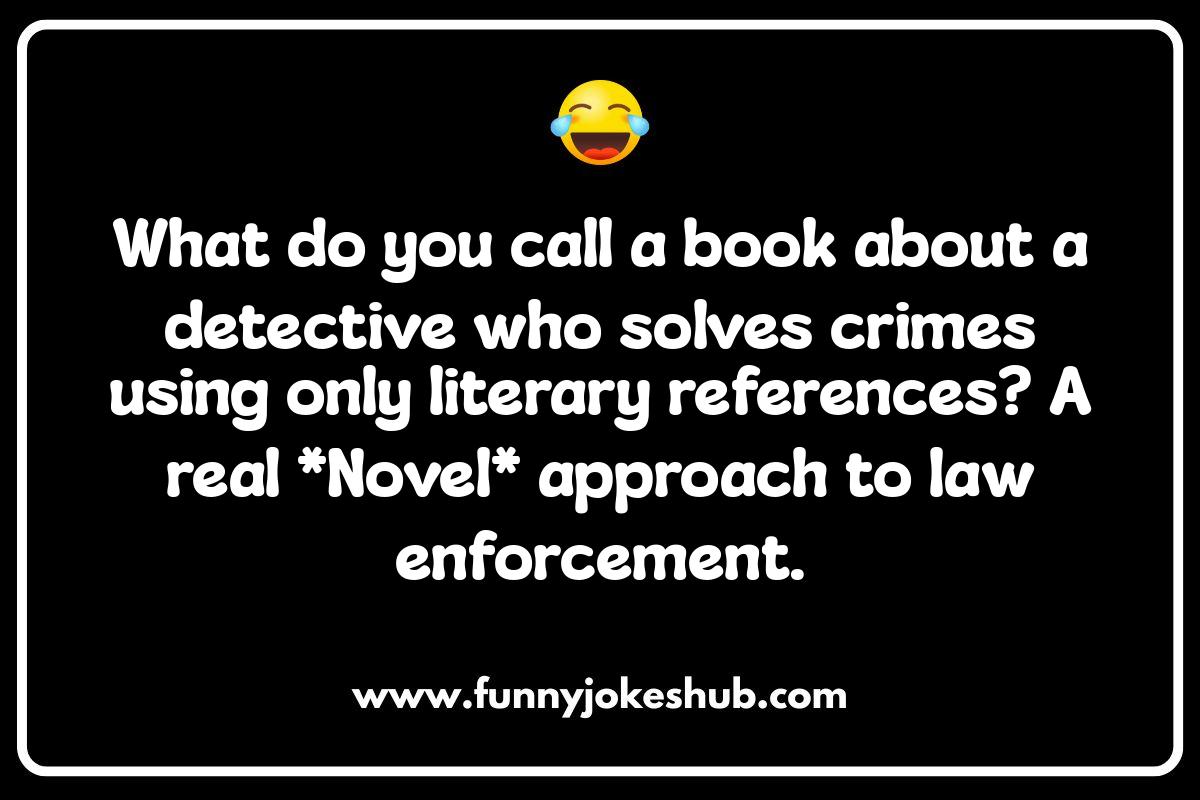
- What do you call a book about a detective who solves crimes using only literary references? A real *Novel* approach to law enforcement.
- Why did the romance novel get a promotion? Because it had a *plot* of potential.
- I tried to write a cookbook about mythical creatures, but it was a real *Beast* of a project.
- My friend tried to write a book about a sentient map, but it kept getting lost in the *details*.
- What do you call a book about a group of philosophers who start a band? A real *Symphony* of thought.
- My attempt at writing a gothic novel ended up being a real *shadow* of its former self.
- Why was the sci-fi novel always so popular? It had a real *stellar* cast of characters.
- What do you call a book about a baker who solves mysteries? A real *whodough*nit.
- I tried to write a novel about a sentient cloud, but it was a bit too *airy* for my taste.
- Why did the thriller get a speeding ticket? Because it was always *plot*-ting to go faster.
- My friend tried to write a book about a haunted library, but it was a real *shelf* of a struggle.
- What do you call a book about a detective who uses only puns? A real *wordplay* of justice.
- My friend tried to write a book about a time-traveling chef, but it was always getting lost in the *past*-a.
- Why did the fantasy novel get a bad review? It was too full of *dragons* and not enough plot.
- I tried to write a book about a sentient shoe, but it was a real *foot*-note in my writing career.
Genre Specific Novels: Hilarious Takes
Ever wondered what would happen if Pride and Prejudice was a slapstick comedy? Or if Dracula told dad jokes? Genre-specific novels, reimagined with a hilarious twist, are the perfect playground for puns and jokes. It’s where classic characters find themselves in absurd situations, proving that even the most serious stories…
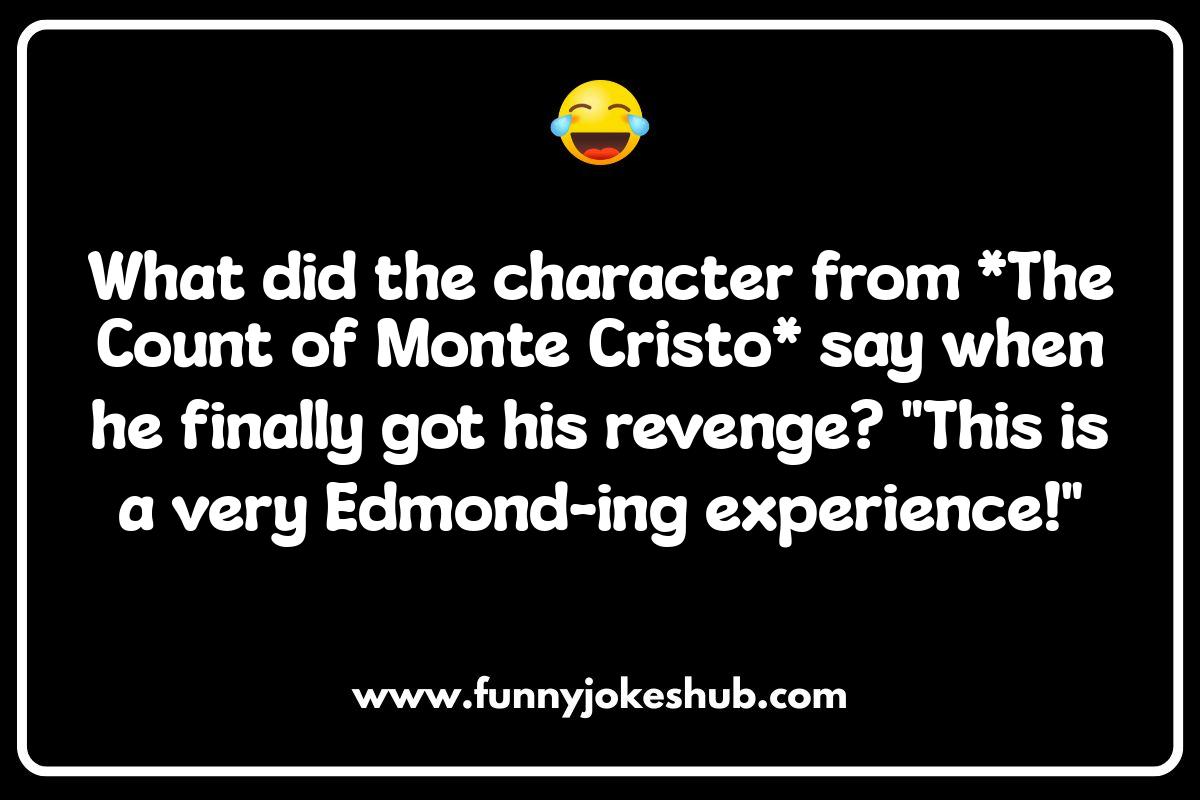
- What did the character from *The Count of Monte Cristo* say when he finally got his revenge? “This is a very Edmond-ing experience!”
- I tried to get a serious conversation going with a character from *The Divine Comedy*, but it was always a descent into infernal puns.
- Why was the character from *One Hundred Years of Solitude* such a bad comedian? Because his jokes were always a cycle of the same old family routines.
- A book about a detective who solves crimes using only literary devices? It was a real *plot* twist of a story.
- What did the character from *A Farewell to Arms* say when he finally got some rest? “This is a real Hemingway-away from the war.”
- I tried to get a serious conversation going with a character from *The Canterbury Tales*, but it was always a pilgrim-age of digressions and old-timey humor.
- A novel where all the characters are literary tropes? It was a real *cliche* of a story.
- Why was the character from *The Picture of Dorian Gray* such a bad art critic? Because he was always so Wilde-ly obsessed with appearances.
- I tried to have a serious conversation with a character from *The Brothers Karamazov*, but it was just a deep and Dostoyevsky-off conversation.
- What did the character from *The Odyssey* say when he finally arrived home? “This is a real journey-end!”
- A book about a group of philosophers who open a bakery? A real *sourdough* of thought.
- Why was the character from *The Catcher in the Rye* such a bad detective? Because he was always getting caught up in his phony investigations.
- My friend’s historical novel about a time-traveling librarian was a real *shelf-help* adventure.
- What did the character from *Beloved* say when she finally found peace? “This is a real spirit-lifting experience.”
- I tried to get a serious conversation going with a character from *Frankenstein*, but he was always so re-animated and had trouble keeping his thoughts together.
Adaptations: Funny Film and Stage Jokes
Ever wondered what happens when Austen meets slapstick? “Adaptations: Funny Film and Stage Jokes” explores the hilarious mishaps of bringing beloved novels to life. Think Darcy doing the tango or Hamlet with a whoopee cushion. It’s a masterclass in comedic timing, proving that even the most serious classics can crack…

- What did the movie adaptation of *The Hunchback of Notre Dame* say when it got a bad review? “Well, that’s a bit of a bell-ringer.”
- A stage production of *Frankenstein* was struggling with the monster’s makeup; they said it was a real re-animating challenge.
- Why did the musical adaptation of *The Odyssey* get bad reviews? It had too many long, winding tunes.
- A film adaptation of *Wuthering Heights* was having trouble with the weather; it was a real storm of a production.
- The stage adaptation of *Pride and Prejudice* was having trouble with the dance scenes, it was all a bit too choreographed for their taste.
- What did the movie adaptation of *War and Peace* say when it ran out of budget? “Well, that’s a real Russian to get the funds back.”
- A musical adaptation of *The Picture of Dorian Gray* was having trouble with the set design; they said it was a real reflection of vanity.
- Why did the film adaptation of *Moby Dick* get so many complaints? It was a whale of a long movie, and a bit too harpooning for some viewers.
- The stage adaptation of *Hamlet* was having trouble with the ghost; they said it was a real spirit-ual challenge.
- What did the film adaptation of *One Hundred Years of Solitude* say when it got confused? “Well, this is a real cycle of stories to follow.”
- A musical adaptation of *The Canterbury Tales* was having trouble with the costumes; it was a real pilgrim-age of wardrobe mishaps.
- Why did the movie adaptation of *The Great Gatsby* get such mixed reviews? It was all flash and no substance, old sport, a real lavish disappointment.
- The stage production of *Les Misérables* was having trouble with the barricade scenes; they said it was a real revolution of effort.
- What did the movie adaptation of *A Clockwork Orange* say when it lost its way? “Well, this is a real droog of a situation.”
- A film adaptation of *The Divine Comedy* was having trouble with the special effects, they said it was a real infernal challenge.
Modern Novels: Contemporary Humor
Modern novels are a goldmine for humor, even if they’re not always *trying* to be. Think of the awkward dating scenes or the overly-earnest protagonists – ripe for puns and jokes! We find ourselves laughing *with* the author, and sometimes *at* them, which is half the fun. Contemporary humor in…

- A character from *Infinite Jest* walks into a bar, orders a drink, and says, “Make it complicated, with lots of footnotes.”
- I tried to write a novel in the style of *The Road*, but it was just a bleak and depressing journey of writer’s block.
- Why was the character from *Cloud Atlas* such a bad comedian?: His jokes were always a disjointed series of timelines and characters.
- My attempt at writing like David Foster Wallace ended with a 1000 page footnote about a misplaced comma.
- I asked a character from *American Gods* for advice, but he just said, “Believe in something, anything, just make sure it’s weird.”
- A character from *The Corrections* walks into a therapy session, and says, “I’m here because everything is wrong and everyone is to blame.”
- What did the character from *The Brief Wondrous Life of Oscar Wao* say when he lost his car keys?: “Ay, dios mio, not another fukú moment!”
- I tried to have a serious conversation with a character from *White Noise*, but it was all just a babble of consumerism and fear.
- Why did the character from *The Handmaid’s Tale* refuse to use a map? She said it was a form of Gilead-ing control.
- What did a character from *Norwegian Wood* say when they got a new playlist?: “This is a real melancholy mix, a true soundtrack for my existential angst.”
- A character from *The Girl with the Dragon Tattoo* walks into a library and asks for books about secrets, the librarian whispers, “They’re all encrypted.”
- I asked a character from *Never Let Me Go* about his future plans, and he just looked at me with a very blank expression.
- Why was the character from *A Visit from the Goon Squad* such a bad comedian? His jokes were always a non-linear mess of time-jumps.
- I tried to have a serious conversation with a character from *The Underground Railroad*, but it was always a journey through history and pain.
- A character from *Tenth of December* walks into a pub and says, “I’ll have a beer, but make it a bit sad, like a story by George Saunders.”






